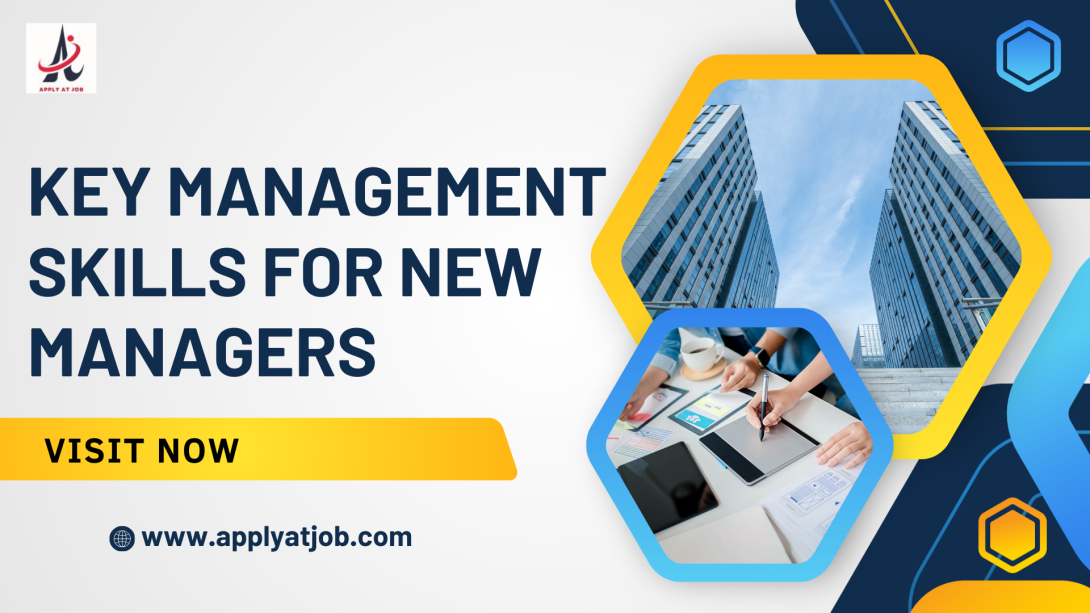
Crucial Supervisory Capabilities for Novices:
Making the move to management is thrilling and difficult at the same time. Knowing the essential abilities needed to lead successfully might be the difference between success and failure for inexperienced managers. This is a summary of key management competencies that will assist newly appointed managers confidently carry out their duties.
1. Skillful Interaction
Effective communication is one of the most important abilities for every manager to possess. Being a manager means that you serve as a liaison between your staff and higher management, therefore the quality of your communication with them affects output and morale. Having clear, succinct, and honest communication guarantees that everyone in your team is aware of the expectations, objectives, and criticism.
Suggestions for enhancement:
. Engage in active listening by making sure you comprehend everything before you answer.
. Adapt your communication approach to each team member.
. Promote frank discussion by welcoming inquiries and criticism.
2. Assigning
Delegation is a difficult skill for new managers to master; they frequently try to handle everything themselves or delegate poorly. Assigning the appropriate work to the appropriate individual is crucial to ensure that tasks are finished quickly and providing opportunity for team members to advance.
Tips for improvement:
. Recognize the advantages and disadvantages of your team as improvement opportunities.
. When assigning jobs, be specific about the results and the due dates.
. Let your staff work without interfering too much.
3. Making Choices
Making decisions that impact your team and projects is a must for managers. An effective leader must be able to assess circumstances, weigh options, and make decisions based on information. Being decisive and accepting accountability for results fosters trust within your team.
Advice for improvement:
. Consider all sides of an issue before making a big choice.
. When it is acceptable, get feedback from your team.
. Make choices quickly; procrastination might lead to ambiguity.
4. Managing Your Time
To be productive, you and your team must effectively manage your time. You'll juggle meetings, deadlines, and unforeseen obstacles in your role as manager. Setting priorities for your team's work and making sure they have adequate time to do it well are critical to preventing burnout and maintaining project management.
Suggestions for enhancement:
. To stay organized, make use of resources like task management applications and calendars.
. Set aside time for team meetings and unbroken work.
. Review your priorities on a regular basis and modify your timetable as necessary.
5. EQ, or emotional intelligence
Understanding and influencing other people's emotions in addition to identifying and controlling your own emotions are components of emotional intelligence. Better team dynamics and higher morale result from managers with high EQs because they foster more sympathetic and supportive work environments.
Suggestions for development:
. Develop empathy by taking into account the viewpoints of your team.
. Maintain composure in stressful situations to inspire your team.
. Promote emotional transparency and camaraderie among your team members.
6. Conflict Resolution:
While conflict is inevitable in any team environment, a manager's approach to it can make or break the cohesiveness of the group. Good conflict resolution entails identifying the underlying cause, paying attention to all sides, and mediating a fair and advantageous solution for the group.
Some areas for improvement include:
. addressing conflicts before they become more serious; remaining impartial and objective when mediating conflicts.
. Encouraging team members to resolve minor issues on their own whenever feasible.
7. Mentoring and Coaching
Developing your staff is one of your responsibilities as a manager. Giving workers constructive criticism, assisting them in overcoming obstacles, and assisting them in realizing their potential are all part of coaching. However, mentoring is a longer-term approach that concentrates on professional development.
Suggestions for enhancement:
. Give team members regular, helpful comments to encourage improvement.
. Show concern for the professional and personal growth of every team member.
. To increase motivation, acknowledge accomplishments and development.
8. Flexibility
Since the workplace is always changing, managers must be adaptable in how they address shifts in priorities, tactics, and team dynamics. Being flexible is having the flexibility to change course as needed to keep things moving forward and being receptive to fresh perspectives.
Suggestions for improvement:
. Remain up to date on corporate and industry developments.
. Set an example of adaptability for your team by being flexible yourself.
. Take the initiative to recognize obstacles and modify your tactics as necessary.
9. Solving Problems
Managers are frequently entrusted with finding innovative solutions to challenging issues. A competent manager is one who can analyze problems, find answers, and put those solutions into practice—whether it's handling a team member's performance or fixing an operational issue.
Tips for improvement:
. Improve by dissecting difficult issues into smaller, more manageable components.
. Make choices based on information and opinions from your team.
. Take the initiative to foresee possible obstacles before they materialize into issues.
10. Establishing Objectives and Monitoring Results
Establishing quantifiable, unambiguous goals is essential to maintaining team concentration and productivity. In order to make sure that goals are being reached, managers must establish expectations, define targets, and monitor performance on a regular basis.
Suggestions for enhancement:
. Establish specific, measurable, attainable, relevant, and time-bound (SMART) goals.
. Check in with your team on a regular basis to track their development.
. Goals should be modified as needed to account for shifts in resources or priorities.
Conclusion:
Gaining these essential management abilities can help new managers lead their teams more cohesively and productively and improve their leadership. Although moving into management might be intimidating, you can overcome obstacles and advance in your position by concentrating on communication, delegating, time management, and emotional intelligence. Recall that developing into a great manager is an ongoing process, so as you acquire more experience, continue honing your abilities.
You can visit our site: Applyatjob.com
https://applyatjob.com/hiring-employee
https://applyatjob.com/jobs




